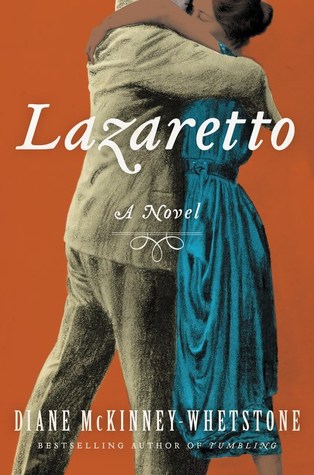
Lazaretto by Diane McKinney-Whetstone. Harper| April 2016| 352 pages | $26.99| ISBN: 9780062126962
RATING: *****/5*
“Sylvia flinched when Nevada said she was pleasing to the eye. She thought her smarts and her sincerity her best qualities, not her looks. She was oak-toned of complexion with a pouty mouth and polite nose and slender build. She had a wide smile that opened her lean face and rounded the severity of her cheekbones. She was often complimented on her smile. Still, she thought her appearance average; certainly didn’t think herself pretty like Nevada was pretty in a way that grabbed men by the collar and said keep your eyes peel on me Mister Sir.”
Set in post-Civil War Philadelphia, this historical fiction novel beautifully explores race, class, gender and family. At the novel’s start, a teen-aged Sylvia assists a young black woman named Meda give birth to a child fathered by her wealthy white employer. The man plans to take the infant away and forces Sylvia to lie to Meda that her newborn died. The event affects both women for the rest of their lives. Sylvia becomes consumed by her medical career while Meda takes care of two orphaned white boys as if they were her own. When the boys grow up and leave the area they maintain a strong bond with each other and with Meda.
Author Diane McKinney-Whetstone creates layered, intriguing characters with flaws, aspirations and strength. She expertly weaves the stories of several families throughout the novel. Sylvia’s friend Nevada isn’t as educated as Sylvia and lives in a rougher neighborhood fueled by booze and gambling. This allows for a stunning contrast with vivid scenes. These descriptions allow readers to understand characters and their temperament and attitude. Sylvia proves to be a dedicated nurse– “She’d get a rush at times when she’d conjure up a cure, often absent the doctor. She thought that marriage, keeping house, would hinder her ability to work; might curtail it completely.” –as well as a loyal friend. Sylvia absorbs her surroundings and effectively adapts as needed: “She called on her innate sense about people as she watched the mostly white people coming and going. They glanced at her as if they were glancing at a barrel, a cart, a post, some inanimate thing that did not breathe or think or feel.”
Sylvia decides to take a position at Philadelphia’s immigrant processing and quarantine station, Lazaretto. Of the new opportunity: “She thought the position beneath her abilities, she was a fully trained nurse after all, but the possibilities inherent in the position enthralled her. Since every ship hoping to enter the Port of Philadelphia had to be cleared through the Lazaretto during the summer months, she might see firsthand the exotic diseases she’d only read about. She would live there for months at a time. She especially welcomed that. The Lazaretto might prove an escape hatch from a conventional life.” When two staff members plan to marry on the compound, a discriminatory attack disrupts the weekend. People discover themselves confronting long-ignored truths, secrets and their place in the world with Lazaretto on lock-down. A superb read and one of the best novels I’ve read this year.
–review by Amy Steele
FTC Disclosure: I received this book for review from Harper Collins.
purchase at Amazon: Lazaretto: A Novel







You must be logged in to post a comment.